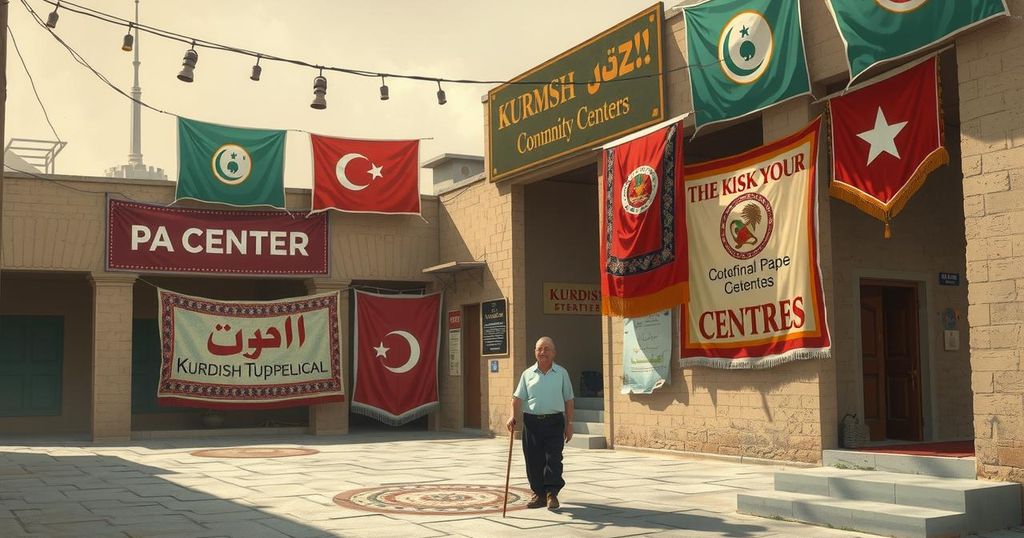The PKK’s Financial Network in Europe and Its Impact on Turkey’s Ceasefire Talks

The PKK has developed a significant financial base in Europe through extortion and fundraising, influencing the peace dialogue with Turkey. Reports indicate coercive practices among the Kurdish diaspora and connections to crime, raising concerns for EU officials. Although called to disarm, skepticism remains about the PKK’s willingness to relinquish its financial incentives, as its historical narrative evolves towards self-governance.
The Kurdistan Workers’ Party (PKK) has established a significant financial network within Europe, essential for its activities and influencing a nascent peace process with Turkey. According to Dutch sociologist Joost Jongerden, the PKK finances its operations through extortion and community engagement, organizing events to promote their cause and collect funds. Reports indicate that they collect a so-called “revolutionary tax” from the Kurdish diaspora, leveraging natural disasters like earthquakes to garner donations, which has prompted concern from EU officials regarding the organization’s links to crime and the drug trade.
Despite being banned in many European countries, the PKK effectively uses community centers to disseminate the ideology of its imprisoned leader, Abdullah Ocalan, while simultaneously organizing rallies and propaganda events to sustain support. Ocalan’s recent call for disarmament raises questions about the organisation’s willingness to comply. Experts such as Richard Outzen express skepticism about the PKK’s compliance with disarmament due to the financial incentives tied to their weaponry and organizational control.
Legal cases in France unveiled sophisticated methods of tax collection, including intimidation tactics to ensure compliance amongst the Kurdish community. Reports of threats and violence associated with PKK collection efforts showcase a disturbing trend of coercion, particularly in contexts where community exclusion or physical harm is threatened for nonpayment. In Sweden, an incident involving armed intimidation for funds highlighted the severity of the PKK’s extortion methods.
The PKK has modified its narrative from pursuing an independent Kurdish state to advocating for localized self-governance, supported by a robust network that operates to rally support across Europe. Moreover, the financial logistics behind their fundraising activities prove central to sustaining their operations amidst ongoing military challenges. The organization’s dependency on illicit activities such as drug trafficking further exacerbates tensions surrounding their legitimacy.
Ocalan’s position as a controversial figure highlights a complex dynamic, as he remains a hero to many Kurds despite Turkey’s condemnation. His call for the PKK to disarm reflects a rare opportunity for potential negotiation yet continues to challenge Turkish authorities’ perceptions and responses toward the PKK’s demands. Although some Kurdish groups advocate for peace, skepticism lingers regarding the PKK’s ability to pivot away from its established revenue channels, which include coercive fundraising.
European intelligence agencies have closely monitored the PKK’s propaganda efforts, which include film productions aimed at portraying their narrative favorably. The PKK’s existing classification as a terrorist organization complicates legal efforts to contest this status, as they face scrutiny from multiple EU nations. Despite the challenges posed by their designation as a terrorist group, the PKK continues to mobilize substantial support and funding, portraying a formidable influence on the Kurdish political landscape in Europe.
The extensive financial web of the PKK in Europe plays a critical role in its operations and potential negotiations with Turkey. As the organization maneuvers between disarmament calls and the sustenance of its funding through various illicit activities, its future remains uncertain. The group’s ability to maintain ties with the Kurdish diaspora while navigating political pressures in Europe reflects its complex standing and the ongoing struggles within Kurdish activism and the broader geopolitical landscape.
Original Source: www.thenationalnews.com








